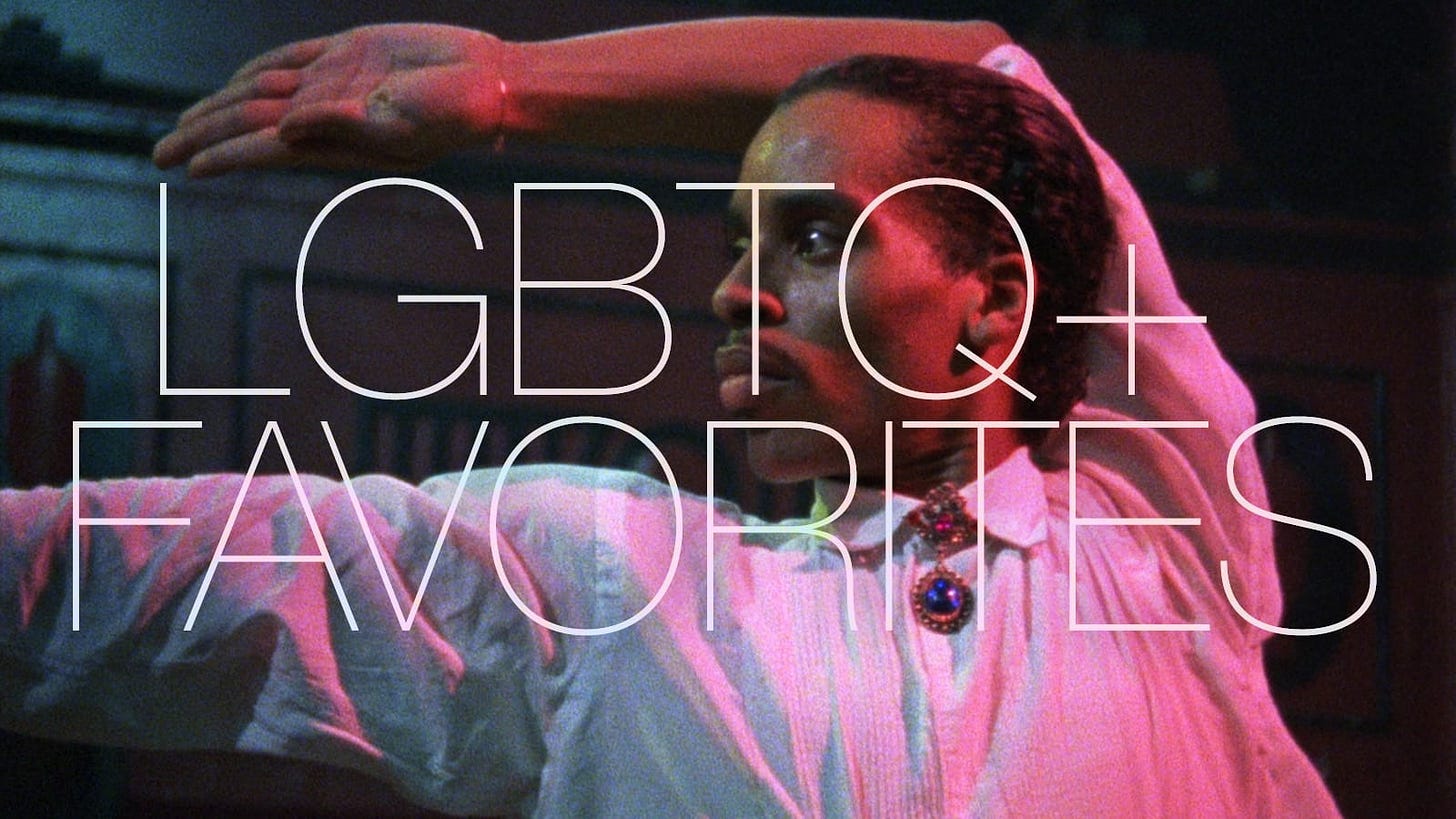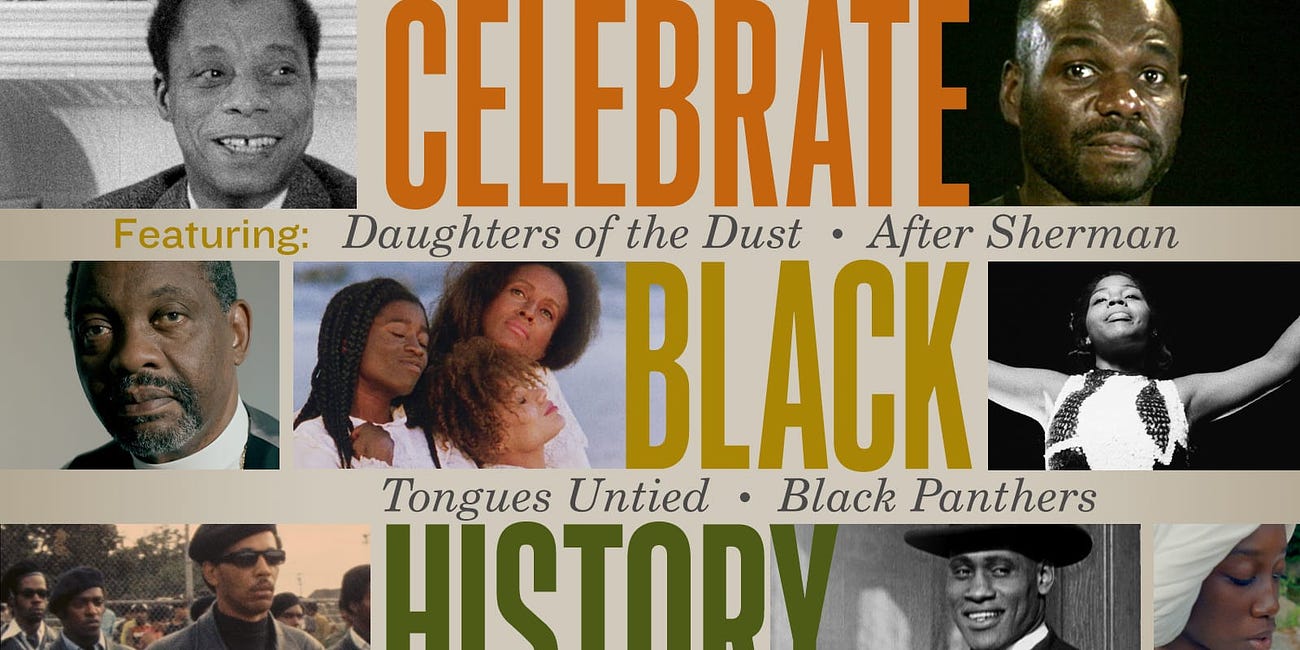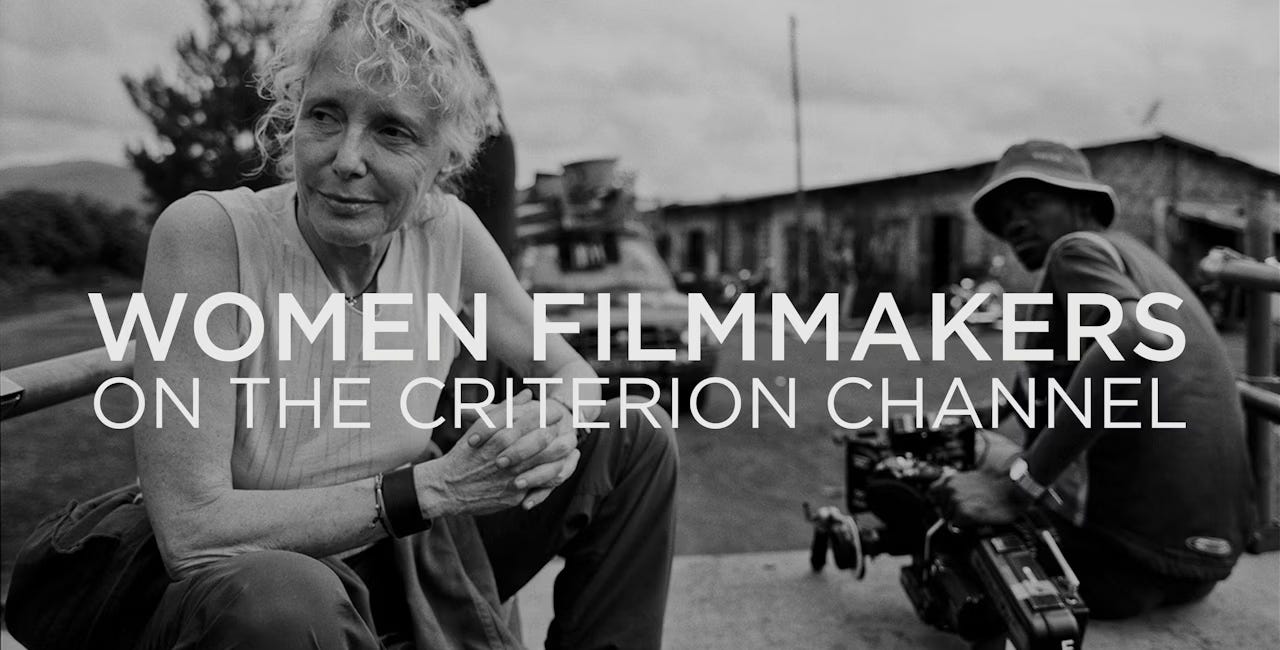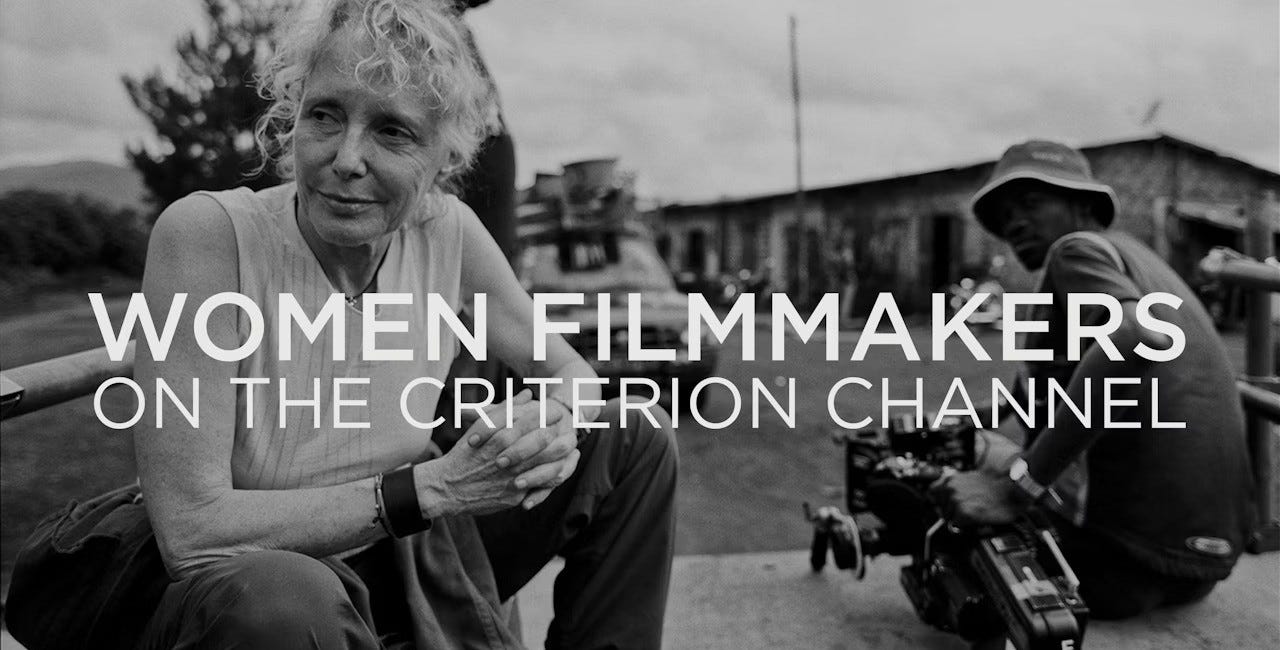Criterion Deep-Dive: 30 Films Celebrating Pride Month! (Part Two of Two)
Highlighting 30 Films by Queer Directors from The Criterion Collection & The Criterion Channel

The Criterion Pride Month deep-dive continues!
I’ve delved into the Criterion catalog to bring you 30 renowned LGBTQ+ films by queer directors that are currently available via The Criterion Collection (Blu-ray & DVD) and/or The Criterion Channel (streaming). One great film for each day of Pride Month! Part Two is below.
30 Critically-Acclaimed LGBTQIA+ Films by Queer Directors from The Criterion Collection & The Criterion Channel: Part Two of Two (in reverse chronological order)
Max (1992) – directed by Monika Treut
As I mentioned in Part One, one unique benefit of the Criterion Channel is their vast selection of short films, and Monika Treut’s groundbreaking Max is another perfect example. Not many people were actively documenting the lives of trans men in 1992, and Max, which provides a raw, unfiltered and extremely intimate one-on-one interview with writer/performer Max Wolf Valerio, very well might be the first documentary centering the voice of a trans man. Max is a particularly charming and affable documentary subject, especially as the film often feels like an extended monologue or Shakespearean soliloquy from the perspective of a trans man mid-way through the transition process. Pioneering queer German filmmaker Monika Treut is the ideal Horatio to Valerio’s reflective, philosophical and incredibly talkative Hamlet. [currently streaming on The Criterion Channel]
My Own Private Idaho (1991) – directed by Gus Van Sant
Step #1: Take two of Shakespeare’s most acclaimed history plays, Henry IV, Part One and Henry IV, Part Two (which are actually about the youthful misadventures of the future English king, Henry V).
Step #2: Chop up the two plots à la Orson Welles’ late masterpiece, Chimes at Midnight.
Step #3: Mash up the Shakespearean/Wellesian plot with a seedy milieu inspired by the world of male street hustlers in John Rechy’s legendary gay novel, City of Night.
Step #4: Sprinkle in a generous amount of winks and nods to queer classics from Querelle to Death in Venice to the films of James Dean.
Step #5: Blend everything together using the cut-up technique of William S. Burroughs and Brion Gysin.
Step #6: Top it all off with River Phoenix and Keanu Reeves (plus memorable cameos from the likes of Udo Kier and Flea).
And voilà! One of the greatest films of the New Queer Cinema! [available on Blu-ray & DVD, will be available to stream on The Criterion Channel from July 1st, 2024]
A Place of Rage (1991) – directed by Pratibha Parmar
I’ve been looking for this film for years, and my wish was finally granted when it was added to The Criterion Channel on June 1st in honor of Pride Month! Needless to say, A Place of Rage did not disappoint. This documentary brings together the voices of iconic writers and activists June Jordan, Angela Davis, Alice Walker, and Trinh T. Minh-ha to discuss issues ranging from the unsung heroines behind the Civil Rights Movement to the prevalence of homophobia within activist communities. Stirring intellectual conversations are juxtaposed with a fabulous soundtrack including Prince, Janet Jackson, the Neville Brothers, and the Staple Singers. Still eerily relevant after nearly a quarter century (and featuring one of the most in-depth discussions of intersectionality I’ve ever seen on film), A Place of Rage was certainly ahead of its time. [currently streaming on The Criterion Channel]
Young Soul Rebels (1991) – directed by Isaac Julien
Another welcome recent addition to The Criterion Channel, artist/filmmaker Isaac Julien’s second narrative feature film is a romantic thriller set in 1977 London during the Queen’s Silver Jubilee. With characters from the British punk and soulboy scenes, the West Indian immigrant community, and the world of indie pirate radio, Young Soul Rebels showcases a brilliant cast of young British talent, including newcomers Sophie Okonedo (whom I worship) and Eamonn Walker in their debut film roles. Also, any film with a soundtrack bringing together the music of Parliament-Funkadelic, X-Ray Spex, Roy Ayers, Jean Carn, War, The O'Jays and Sylvester (!) automatically qualifies as a personal favorite in my book. [currently streaming on The Criterion Channel]
Paris Is Burning (1990) – directed by Jennie Livingston
“Legendary! Tens, tens, tens across the board!”
“Why you all gagging so? She brings it to you every ball.”
“Touch this skin, darling, touch this skin honey, touch ALL of this skin!”
I can probably quote every single line from Paris is Burning, which I daresay is the most influential queer film of all time. There’d be no RuPaul’s Drag Race without Paris is Burning. The documentary’s entire lexicon has been universally embraced by the LGBTQIA+ community worldwide. (I’ve seen kids from Montreal to Macedonia to Manila vogueing, reading, throwing shade and shouting “Slay! Stomp that runway!”) Directed by Jennie Livingston, this trailblazing milestone spotlights the experiences of Black and Latinx gay, queer and trans performers in NYC’s 1980s ballroom scene. A fabulous time capsule bursting with sequins and glitter, this cult classic has forever preserved the heretofore marginalized voices of legendary icons like Pepper LaBeija, Venus Xtravaganza, Dorian Corey, Octavia St. Laurent, Willi Ninja, and of course emcee Junior Labeija: “O-P-U-L-E-N-C-E. Opulence! You own everything. Everything is yours.” Did I mention I can quote every line? [available on Blu-ray & DVD, currently streaming on The Criterion Channel]
Tongues Untied (1989) – directed by Marlon Riggs
If I hadn’t decided to limit this list to one film per director, I’d be tempted to include everything directed by the late great Marlon Riggs (now collected in a priceless Criterion box set). But if I must choose just one, then my first recommendation would have to be Tongues Untied. The first film by an openly gay Black director to proudly spotlight and celebrate Black queer identities while unapologetically confronting homophobia in the Black community and racism in the white gay community, this trailblazing documentary is an aesthetic triumph. [available as part of a 3-disc DVD or 2-disc Blu-ray box set - The Signifyin’ Works of Marlon Riggs, currently streaming on The Criterion Channel]
I’ve Heard the Mermaids Singing (1987) – directed by Patricia Rozema
The quirkiest of quirky queer classics. Patricia Rozema writes, directs, produces and stars as a socially awkward photographer named Polly, a perpetual daydreamer with a wild imagination. Whereas the rest of the world sees a peculiar young woman with spiky orange hair riding a bicycle, in Polly’s mind she’s flying through the sky on a magical journey of self-discovery. This whimsical yet deeply philosophical romance is an avant-garde ode to everyone who marches to the beat of their own drum. [currently streaming on The Criterion Channel]
Maurice (1987) – directed by James Ivory, produced by Ismail Merchant
The long-term professional, romantic, creative and domestic partnership of Indian film producer Ismail Merchant and American director James Ivory is one of the greatest collaborations in film history. Lasting over 44 years (until Merchant’ death in 2005), the acclaimed Merchant-Ivory films are consistently among the most interesting and most beautiful period pieces and literary adaptations in world cinema. Merchant-Ivory set the standard for every classic British film that followed, and Maurice stands out as a personal favorite (in my opinion one of the greatest romantic films of all time). A lush adaptation of E.M. Forster’s exquisite novel of the same name, Maurice was originally written in 1913-1914, and yet remained unpublished until 1971 after Forster’s death (as Forster feared it would destroy his reputation and possibly result in criminal prosecution due to U.K. laws criminalizing homosexuality). In terms of the queer canon, the novel is required reading, and the film is required viewing. James Wilby, Hugh Grant, and Rupert Graves (alongside acting legends Ben Kingsley and Simon Callow) are the perfect cast to bring this posthumous masterpiece back to life. [currently streaming on The Criterion Channel]
Working Girls (1986) – directed by Lizzie Borden
“Tumble out of bed and I stumble to the kitchen / Pour myself a cup of ambition / And yawn and stretch and try to come to life. / Jump in the shower and the blood starts pumpin’ / Out on the street, the traffic starts jumpin’ / With folks like me on the job from nine to five . . .” Neither Dolly Parton nor Jane Fonda nor Lily Tomlin appear in this movie, nor does the song quoted above, and yet I can’t get the theme song from 9 to 5 out of my head whenever I think about Lizzie Borden’s feminist tour de force, Working Girls. Set in a Manhattan brothel in the early 80s, this remarkably subversive film explodes a host of cultural stereotypes, looking at sex work from the point of view of the eponymous working girls, who quite understandably often view their work just like any other boring office job. In fact, their complete and utter boredom, coupled with their near-total indifference to their male clients, makes Working Girls probably the least erotic and most refreshingly honest film I’ve ever seen on the subject of the world’s oldest profession. [available on Blu-ray & DVD, currently streaming on The Criterion Channel]
Desert Hearts (1985) – directed by Donna Deitch
Donna Deitch’s 1985 indie film-that-could, Desert Hearts, and the paradigm-shifting novel it’s based upon, 1964’s Desert of the Heart by Jane Rule, are just as essential to the literary and cinematic queer canon as E.M. Forster’s and Merchant-Ivory’s versions of Maurice (see above). Set primarily in Reno, Nevada in 1959, the tangled love story of uptight English professor Vivian (Helen Shaver) and free-spirited sculptor Cay (Patricia Charbonneau) was completely groundbreaking on every level. Desert Hearts is widely considered to be the first feature film centered around a positive depiction of lesbian romance, and Desert of the Heart is considered one of the first popular novels to elevate sapphic subject matter from the realm of lurid pulp fiction to the respectability of hardcover literature. I repeat, both the book and the film are two more essentials. [available on Blu-ray & DVD, currently streaming on The Criterion Channel]
The Times of Harvey Milk (1984) – directed by Robert Epstein
The first LGBT-themed film by an openly gay filmmaker to win an Academy Award (for Best Documentary Feature in 1985), Rob Epstein’s The Times of Harvey Milk was also selected by the Library of Congress for preservation in the National Film Registry after being deemed “culturally, historically, or aesthetically significant.” Narrated by Harvey Fierstein and informed by a vast array of interviews and archival footage, this riveting account of the life, assassination and legacy of LGBTQ+ hero Harvey Milk is a significant achievement in documenting queer history from the perspective of those who lived it. And after watching it again, I must say that The Times of Harvey Milk (as well as Epstein’s impressive filmography as a whole) undoubtedly influenced the style and tone of countless subsequent queer documentaries over the past few decades. Many of the exact same photos and clips are used again and again across the Pride Month programming lineup that pops up every June. But Rob Epstein and his artistic collaborators did it first, and better, than all of the imitations that have since followed the trail he blazed. [available on Blu-ray, currently streaming on The Criterion Channel]
Querelle (1982) – directed by Rainer Werner Fassbinder
In the interest of including a diverse array of queer voices, I decided to limit this list to only one film per director. Which meant one of the first questions I asked myself was: “Which Fassbinder film do I pick? Which one?” Because The Criterion Collection and The Criterion Channel boast an impressive selection of Fassbinder treasures, including In a Year of 13 Moons (an early sympathetic, nuanced portrayal of a trans woman), The Bitter Tears of Petra von Kant (a lesbian melodrama with an all-female cast), and Fox and His Friends (a scathing satire about a queer circle in 1970s West Germany). I easily could’ve picked any of those films (I love them all), but when Criterion announced that the brand-new, high-definition digital restoration of Fassbinder’s Querelle would be released on Blu-ray this June in honor of Pride Month, my decision was instantly made. Querelle (based upon the brilliantly salacious novel about queer sailors by Jean Genet) is not only one of my favorite Fassbinder films, but this aesthetically arresting new digital restoration is truly a feast for the eyes. And I don’t just mean star Brad Davis (who is indeed very easy on the eyes), but rather the entire glorious experience — from the lush cinematography and opulent set designs to the frenzied kaleidoscope of vivid colors. [available on Blu-ray & DVD, currently streaming on The Criterion Channel]
Pink Flamingos (1972) – directed by John Waters
The first undeniable cult masterpiece from the beloved “Pope of Trash” himself, John Waters (one of the funniest, most outrageous and most incisive wits of our age), how does one even begin to describe the transgressive chaos of Pink Flamingos? Billed as “an exercise in poor taste,” Pink Flamingos stars drag queen Divine as Babs Johnson (the self-proclaimed “filthiest person alive”) alongside fellow Dreamlanders (Waters’ regular cast of Baltimore misfits) including Mink Stole, Edith Massey, David Lochary, Mary Vivian Pearce and Cookie Mueller. I won’t even attempt to summarize the plot, but as far as the final scene is concerned (No spoilers! But it will probably spoil your appetite!), John Waters’ own voice-over states that Divine is “not only the filthiest person in the world, but she is also the filthiest actress in the world!” [available on Blu-ray]
Death in Venice (1971) – directed by Luchino Visconti
Luchino Visconti’s bold aesthetic vision. Thomas Mann’s haunting novella. Gustav Mahler’s soaring music. Pasqualino De Santis’ transcendent cinematography. Death in Venice is quite simply, and quite extravagantly, one of the most beautiful films in existence. In the words of protagonist Aschenbach: “The creation of beauty and purity is a spiritual act.” [available on Blu-ray & DVD, currently streaming on The Criterion Channel]
Sunday Bloody Sunday (1971) – directed by John Schlesinger
This was not your typical on-screen love triangle for 1971. The brilliant Peter Finch plays Daniel, a gay man in his mid-50s. The divine Glenda Jackson plays Alex, a recently divorced woman in her mid-30s. They are both in love with Bob, a capricious, bisexual sculptor in his mid-20s (played by the dashing Murray Head). Daniel and Alex are mutual acquaintances in the same circle of friends, and both are painfully aware that Bob is quite openly dating them both simultaneously, flitting back-and-forth from one to the other despite their attempts to hold onto him for themselves. So much emotional drama ensues. As a viewer, you are pulled into the psychological entanglement and can’t turn away. Especially with all three outstanding, award-winning actors each giving the performance of a lifetime. [available on Blu-ray & DVD]
There you have it! 30 critically acclaimed queer films by LGBTQIA+ directors, all currently available via The Criterion Collection and/or The Criterion Channel. [Click here if you missed Part One.]
For even more great films (including many spectacular short films), have a look at the following collections: LGBTQ+ on The Criterion Channel, Out at Criterion: LGBTQ+ Films in The Criterion Collection and LGBTQ+ Favorites.
And if you’d like instant streaming access to The Criterion Channel’s staggeringly prolific (and beautifully curated) library of critically acclaimed films, sign up for a 7-day free trial of The Criterion Channel here!
Happy Pride Month everyone! Let’s celebrate the achievements of queer filmmakers (as well as queer writers, musicians, actors, dancers, chefs, and artists in every medium) all year round! (We certainly do!)
And if you’d like even more film recommendations . . . check out the following articles:
Our Big Queer List of Essential LGBTQ+ Films!
Happy Pride Month everyone! It’s time for a deep dive! We’ve seen A LOT of great LGBTQ+ films over the years, so we decided to compile a giant list of films and documentaries for your viewing pleasure. We couldn’t include everything. Believe it or not, our original list was much, much,
Criterion Deep-Dive: 29 Films Celebrating Black History Month! (Part One of Two)
My husband and I are both lifelong film buffs, and in recent months we have been immersed in a deep-dive into the treasures of The Criterion Collection and The Criterion Channel. Cinematic gems from Criterion’s abundance of critically-acclaimed films (on both Blu-ray and strea…
Criterion Deep-Dive: 29 Films Celebrating Black History Month! (Part Two of Two)
My husband and I are both lifelong film buffs, and in recent months we have been immersed in a deep-dive into the treasures of The Criterion Collection and The Criterion Channel. Cinematic gems from Criterion’s abundance of critically-acclaimed films (on both Blu-ray and strea…
Criterion Deep-Dive: 31 Films Celebrating Women's History Month! (Part One of Two)
The Criterion deep-dive continues! Last month I compiled a list of cinematic gems from The Criterion Collection and The Criterion Channel to celebrate critically-acclaimed films made by…
Criterion Deep-Dive: 31 Films Celebrating Women's History Month! (Part Two of Two)
The Criterion deep-dive continues! Last month I compiled a list of cinematic gems from The Criterion Collection and The Criterion Channel to celebrate critically-acclaimed films made by…







